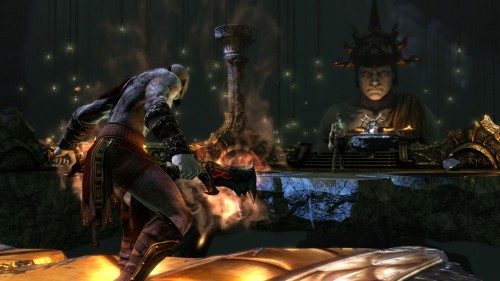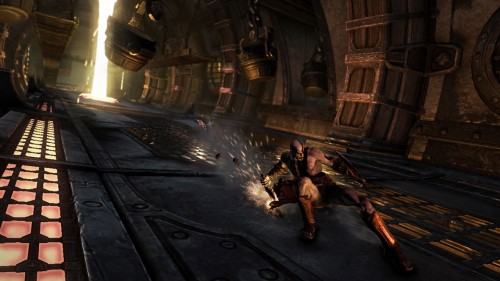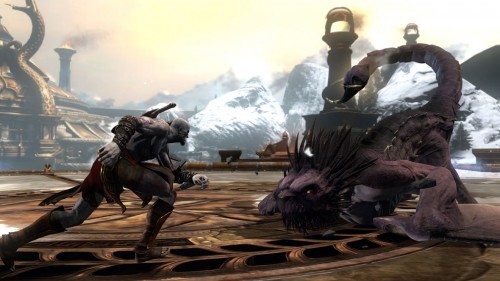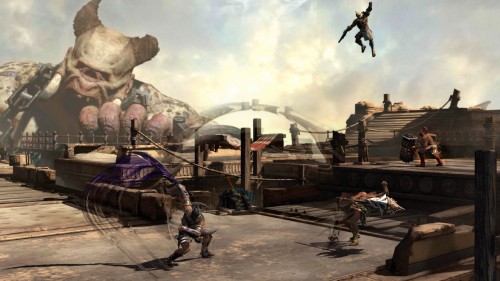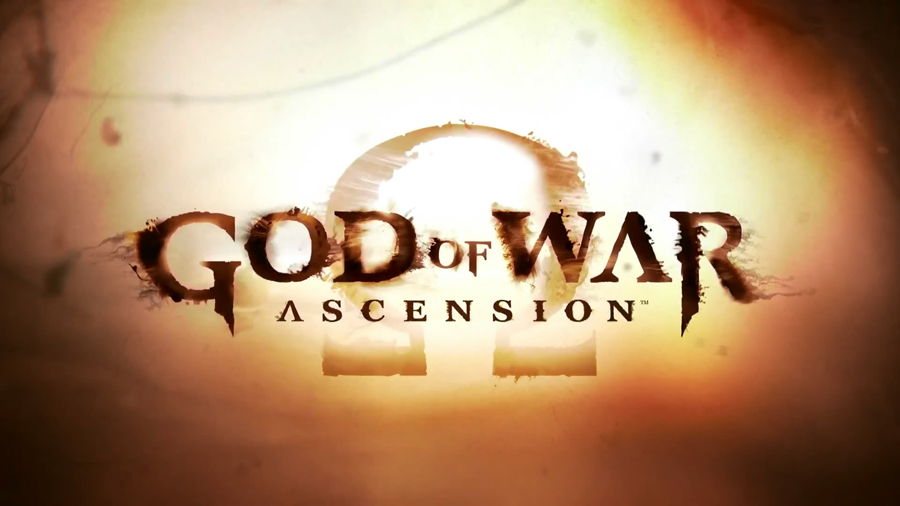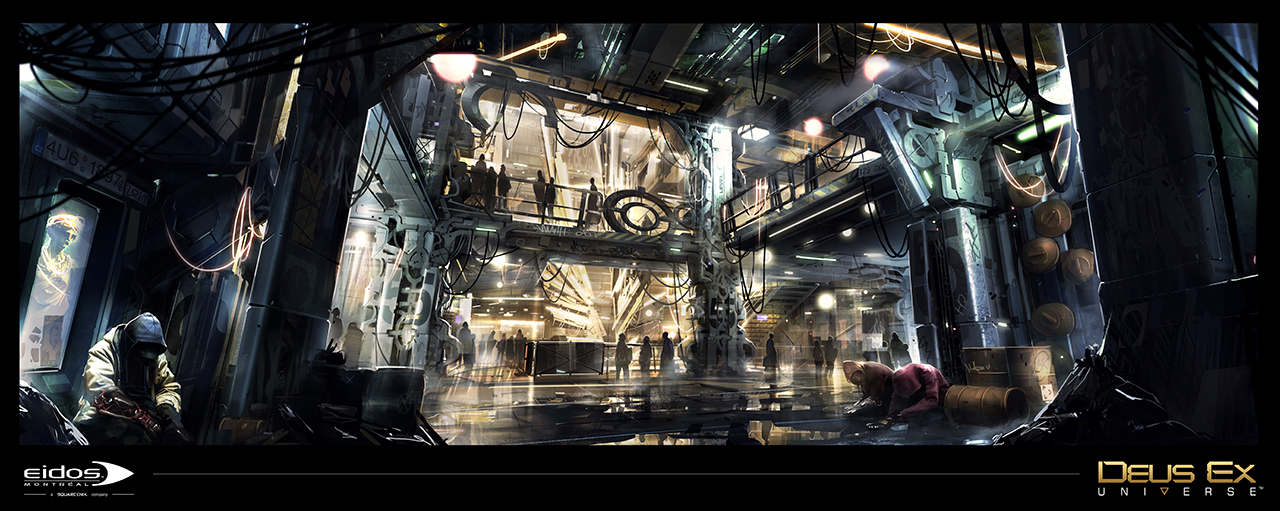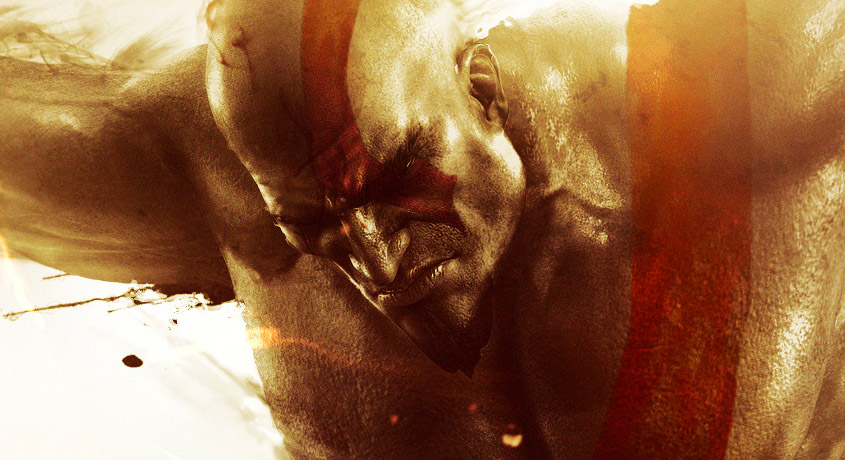
When appraising a new entry in a long-running series, I believe that one should try to judge it for what it is, rather than for that which it is not. In the case of God of War: Ascension, the fourth console entry in its franchise (and seventh overall, if one counts its mobile incarnation), I would not dare to criticise it for its linearity, its coarse brutality, or its unabashedly accessible combat. These are the trademarks of the franchise, and to criticise Ascension for toeing the line and delivering what its fans expect seems fruitless; instead, it seems preferable and altogether more constructive to consider a game like Ascension within the context of its series, and judge it against its forebears. Within this critical framework, the biggest questions surrounding Ascension appear obvious: how beautiful is it, how epic its scope? Has Sony Santa Monica managed to top the baroquely violent, ever-escalating opera of carnage offered by God of War 3? Sadly, and somewhat surprisingly, the answers to these questions are fairly clear; Ascension is a supremely entertaining hack-and-slash, but is without doubt the weakest entry in its franchise on all possible fronts.
The most glaring misstep Sony Santa Monica has made is assuming that fans of the series are little about context, and are content to murder their way through Greek mythology without rhyme or reason. Whereas God of War 3 had the advantage of being a trilogy-capper that followed Kratos’ quest to tear down all of Mount Olympus, Ascension purports to go back to the beginning of the narrative timeline, telling the tale of how the Spartan general Kratos sought to break his blood oath to Ares, the god of war, and evade the punishing gaze of the relentless Furies, a trio of sisters whose very role is to enforce such oaths. The game’s position as a prequel immediately gives it a whiff of redundancy, with most demanding that there be good reason for Sony Santa Monica to look backwards. Sadly, the veteran developer has not succeeded in justifying its decision, with Ascension boasting the thinnest story in a series rife with basic plots. What could have been an opportunity to explore Kratos’ feelings of guilt and growing anger towards Olympus are completely botched, with most of the game preferring to eschew any pretense of motivation or context. Most of the time, Kratos is simply moving from place to place with the vague objective of defeating the Furies, and half-hearted attempts to spice up the bland story by jumping back and forth in time come off as desperate. Previous games were never strong on character, and Ascension could have changed that; instead, Kratos is barely present, with perhaps a few dozen lines in total. In lieu of an actual arc, or dramatic momentum, Sony Santa Monica’s writers seem content to merely convey a violent series of events. Things happen (although not many) and creatures die – but it’s never clear why, and its always impossible to care.
With such a non-existent story, Ascension is instead forced to rely on the large-scale setpieces and grand encounters that have been a mainstay of the series. When all else has failed, each of the God of War games (perhaps with the exception of the relatively low-key PSP-entry, Chains of Olympus) has managed to boast battles of escalating intensity with a rogues gallery of Greek myth, whether it be the original game’s groundbreaking Hydra battle or the third entry’s screen-filling boss battles with Poseidon and Chronos, that have lifted the pace and tempo and made their respective games so memorable. In this regard, Ascension is a mixed bag of highs and lows. The game’s opening and ending bosses are visually spectacular, albeit mechanically unexciting, but there’s little in between to raise one’s pulse. There are less than a half-dozen major encounters in the game, and none of them packs much of a punch.
Worse, the game’s status as a prequel relegates Kratos to taking down the C-List of Greek mythology, and so instead of slaughtering Hades, the god of the underworld, or Chronos, the king of the Titans, Kratos must instead do battle with, er, Castor and Pollux (google them, if you must). While it’s true that the original God of War boasted relatively few set pieces and only three major boss battles, expectations have changed in the last eight years, particularly since the releases of both God of War 3 and Uncharted 2: Among Thieves, arguably the vanguards of the Modern Age of Spectacle, and in that context, Ascension underwhelms. Vast stretches of the game occur, largely without incident, save for encounters with ordinary enemies (oh-so-many goat-men!) and an enormous amount of puzzling and platforming, and in the stark light of day, God of War‘s weaknesses are laid bare. Without the sound and fury, and without the colourful cavalcade of larger-than-life renditions of the iconic heroes and villains of legend, there’s not a lot of sophistication present in the series’ mechanics or its overall design.
God of War: Ascension is, at the very least, a very handsome game, boasting art and creature designs that are as evocative and sumptuous as anything in the series’ history. At times, the game looks spectacular, with Kratos himself never looking better, but, sadly, the game does not quite perform on-par with its illustrious predecessor. Image quality seems to have taken a noticeable hit, and the game seldom performs above thirty frames per second, unlike God of War 3, which would frequently perform at sixty frames per second and cleverly employed motion blur to smooth out any hitches. This apparent lack of polish is also present in other aspects of the game’s presentation, in ways that one would not ordinarily expect of a God of War game. Chief among the blemishes is the game’s appalling audio mix, which often relegates the background music to barely audible levels and sees effects drop out altogether at random moments, significantly diminishing the impact of key moments that would otherwise be fairly exciting. The sum total of these issues is that God of War: Ascension just doesn’t look or sound as good as series’ fans have come to expect, which is a significant problem for a series where presentation has been as significant a component as its gameplay.
On the gameplay side of the equation, too, God of War: Ascension registers as something of a minor letdown. Sony Santa Monica has seen fit to tweak Kratos’ core combat in some interesting ways, which is not a terrible notion given that the series’ core mechanics have evolved only marginally since its inception, but the sum of these changes is somewhat underwhelming and renders Ascension occasionally clumsy to play. Sony Santa Monica has, wisely, focused on the chain blades (recognising that these are by far the most popular and versatile weapons in Kratos’ armory), imbuing them with elemental powers that can be switched on the fly. These elemental properties, canvassing fire, ice, lightning and ‘soul’, each boast different effects (ice freezes enemies upon contact, and lightning staggers foes, for example) and magic spells, but also different moves and combos. Unfortunately, where the default chain blades once offered up many different moves, it seems as if Sony Santa Monica has tried to differentiate the elemental properties by splitting the old move-set across them. The end result is that the blades feel less versatile at any given time, with Kratos only being able to employ old favourites by switching between elements. While incentivising variation is admirable, Kratos feels unnecessarily limited, which hampers many of the standard combat encounters. On the upside, the new ability to tether enemies to a chain and then swing them around like projectiles or simply hold them at bay while fighting others is a clever wrinkle that amplifies tactical possibilities, and a ‘found’ weapon system is a clever way of expanding Kratos’ move-set without introducing separate weapons which a player is unlikely to invest in. These ‘found’ weapons, dropped by enemies or simply located in the environments, range from swords to spears to shields and are typically used in quick bursts (tied to the circle-button) before being discarded, and their improvisational quality encourages experimentation. Sony Santa Monica’s efforts at refining the combat fundamentals of God of War are truly admirable, which makes it a slight shame that not all of the changes pay off or result in a combat system that meaningfully improves on God of War 3, which remains the apex of the series.
While God of War: Ascension fails to do anything significant to evolve or improve the single player experience that the franchise is famous for, its great innovation is in the inclusion of the controversial multiplayer mode that was the primary focus of the game’s marketing campaign in the lead-up to its release. While many reacted with understandable skepticism to the inclusion of multiplayer to a traditionally solitary experience, the mode is actually quite enjoyable, if quite detached from the single player component. The mode is akin to something like Dreamcast-favourite Powerstone, offering up third-person brawls for up to eight players from an elevated perspective, with players choosing to align with one of four Olympian gods: Zeus, Poseidon, Hades or Ares, each of which offers up a different emphasis (whether it be brute strength, or an emphasis on magic). Success in battles offers up the standard reward of experience points that allow for upgrades to weapon, armour and abilities, and this ‘carrot on a stick’ encourages a sense of persistence and addictiveness that a good multiplayer mode needs to succeed. With a good range of modes and some truly spectacular arenas (that offer up unique boss characters of their own), Ascension succeeds in offering up a unique and fleshed out alternative to the single player campaign. Better yet, the co-operative ‘Trial of the Gods’ mode allows players to team up in a wave-based horde mode against five waves of increasingly difficult encounters and test their skills against the clock, and it was in this mode that I truly felt the potential of what a multiplayer God of War experience could and should be.
And so, the net result is that God of War: Ascension is a good game beset by weaknesses, and one that ultimately pales in comparison to its impressive predecessors. Given that three years have passed since God of War 3, series fans are entitled to expect more than a stop-gap to tide the series over until its inevitable next-generation debut. Ultimately, this is what Ascension is: a game of obligation, not inspiration, executed by a group of competent professionals in a workmanlike manner. For a flagship Sony franchise, this is just not enough, and if the series is to survive and thrive, I hope that its curators take a break to reconsider their next step and come out swinging with a title of the polish and scale that Kratos deserves.
Beautiful Visuals | Surprisingly enjoyable Multiplayer | Some amazing set pieces...
... That pale in comparison to those in God of War 3 | Terrible audio mixing | Combat has taken a small step backwards

